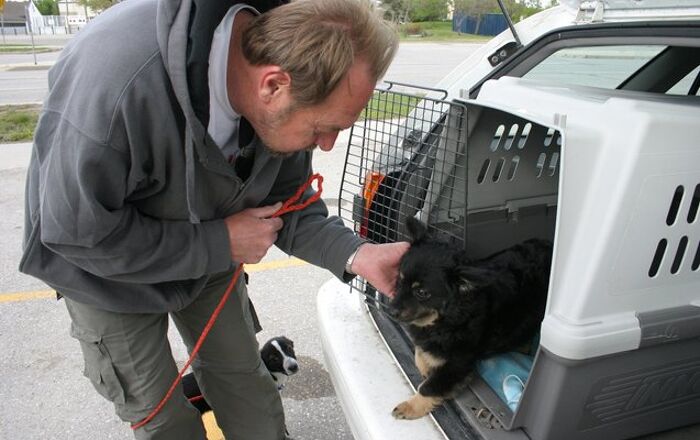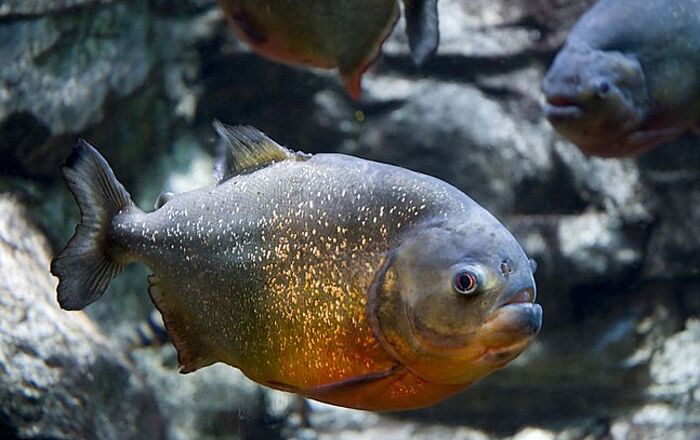
Older dogs have specialized dietary needs. Sabine Contreras, Canine Care and Nutrition Consultant, knows just what to serve up to your senior dog to ensure he’s getting the nutrition, minerals and vitamins he needs.
Older dogs have nutritional needs that differ from those of younger ones, but then just when is a senior dog considered a senior? Many dog food companies and veterinarians will tell you that a dog is a senior once he or she turns seven years old, but it’s not that simple.
First of all, dogs of different breeds and sizes have different life expectancies. A small- or medium sized dog may well live 15 years or longer and will not show any signs of aging at seven years old. Giant breeds, such as Great Danes, will already be into the last third of their lifespan already.
But even dogs of the same (or similar) breeds and sizes will age at different rates, depending how soon and how fast the body’s systems slow down and deteriorate. Annual wellness exams, preferably including blood work, will help you to determine when your dog might benefit from changes to diet and extra nutritional support. And since blood work done at any point in a dog’s life is just a “snapshot” of the current condition he is in, it would be smart to start including them now rather than a few years down the road if you truly want to benefit from the information they can offer.
Some of the special dietary needs of older dogs originate from:
• decreased activity levels;
• mobility and joint issues;
• decreased digestive and metabolic efficiency;
• decreased immune and organ function;
• increased occurrence of intestinal problems;
• declining dental health.
Research has shown that senior dogs, as long as no other health issues require the reduction of protein for specific reasons, actually remain healthier with a higher protein level in their diet than on low-protein “Senior”, “Less Active” or “Weight Management” foods.
Not only may senior dogs have a higher protein requirement because they can simply not digest and metabolize it as efficiently as younger dogs anymore and need to make up for that by increased intake, but a study also found a higher mortality rate in senior dogs that had been fed a diet lower in protein than the average adult food compared to those fed a diet higher in protein.* One thing that definitely makes a difference for compromised kidney function is the phosphorus content of the diet, so working on lowering that is generally a good idea. When comparing products, don’t go by phosphorus percentage though, as percentages are always relative and tell you little about how much your dog will actually consume (you will have to feed less for weight maintenance of a more nutrient dense food with a higher phosphorus content, since your dog will have to consume more of a less nutrient dense food that may show a lower percentage). Digestibility is also a big factor. Instead, compare the actual phosphorus content per 1,000 calories (kcal) or based on your dog’s specific daily caloric intake.
Dry kibble tends to have high phosphorus percentages compared to wet (can, tray, pouch, frozen, or refrigerated) product options, and these also contain higher quality ingredients, fewer additives, and require no preservatives. Stay away from wet foods containing rendered meat meals, as they contribute greatly to phosphorus levels. The natural moisture content from less processed diets is an added bonus.
Thoughtfully selected supplements can make a big difference in how your dog’s body copes with old age. Let’s go over a few that can help your senior dog age gracefully and that can the most common issues related with aging.
- Wild salmon or sardine/anchovy oil
Do not use
- Vitamin E
Whenever omega 3 fatty acids are supplemented, vitamin E is depleted more rapidly in the body, so it is important to also give extra vitamin E to maintain a good balance. Only use natural vitamin E supplements, as synthetic ones are not as effective. Vitamin E from natural sources is labeled as “alpha tocopherol”, “d-alpha tocopherol” or “mixed tocopherols” (dl-alpha tocopherol indicates a synthetic product). Overall, a supplement that contains “mixed tocopherols” (different components of the vitamin E complex) is nutritionally more valuable (but also more expensive) than plain d-alpha tocopherol.
- Joint Support
Our primary goal for joint support is to decrease inflammatory processes (which can be greatly influenced by diet composition), and the fish oil listed above will already go long way in that regard.
Additionally, studies have shown that undenatured type II collagen is effective in the treatment of rheumatoid arthritis, and preliminary human and animal trials have shown it to be effective in treating osteoarthritis. Raw feeders are ahead of the curve here, since raw chicken cartilage for example is an excellent, natural, and inexpensive source.
Glucosamine, MSM (MethylSulphonylMethane), Perna canaliculus (Green Lipped Mussel), Dimethylglycine, Hyaluronic Acid and Ester C (buffered vitamin C) are all excellent options that work best in a combination approach instead of just one individual item alone. It’s best to carefully experiment which works best for each individual dog, as some cannot tolerate shellfish (e.g. Green Lipped Mussel or glucosamine sources from shrimp and/or crab), while others may get excessive gas from MSM.
- GI Disturbances
Digestive issues tend to become more common in old age, especially constipation or loose stool. Constipation often results from decreased activity and lack of exercise, which affect intestinal motility. Being active, such as when going for walks or swimming, tones the digestive tract and helps it to function more efficiently, while loose stools can result from stress and anxiety (pain, loss of vision, etc.), decreased digestive capacity, or from becoming more sensitive to certain food ingredients.
In either case it’s a good idea to give a high-quality probiotic supplement daily. Probiotics are “friendly” bacteria that aid digestion and absorption of nutrients. They help to keep harmful bacteria from colonizing and creating digestive problems, and thus support the body in fighting illness and disease. If beneficial bacteria become depleted or the balance is disturbed, potentially harmful (pathogenic) bacteria can overgrow, causing problems. Friendly bacteria also directly support the immune system, increasing the body’s own defenses against disease. Benefits only really become apparent when used consistently long-term, and acidophilus is the most well researched bacteria strain. The most important detail is the concentration of “Colony Forming Units” of organisms, or CFU. To provide a truly therapeutic effect, a product should supply at the very least 1-2 billion CFU per serving. Do not waste your money on products that contain only several millions, or even just tens of thousands.
The second most important detail is how long the potency of CFU is guaranteed – it’s better if the guarantee applies throughout the shelf life of the product rather than just “at time of manufacture”. I generally find supplements marketed for human use of much higher quality than anything marketed for pets.
Additionally, a high-quality source of fiber will help dogs with constipation. As a rule of thumb, green vegetables that grow above ground will help soften stools, while root vegetables that grow below ground will firm them up. Plain canned pumpkin (without salt, sugar, or spices added) is often helpful for both conditions.
If your dog tends to have loose stools, a high-quality blend of digestive enzymes can be helpful. It should contain specific enzymes to break down all three macronutrients: protein (proteases, peptidases), fat (lipases) and carbohydrates (carbohydrases, e.g. amylase).
Check the ingredient list for poor-quality ingredients like flavoring agents, stabilizers, and undesirable additives like for example menadione (a controversial vitamin K supplement).
Just like choosing the right food for your puppy or adult dog, it is important to take the individual dog’s needs into consideration when feeding a senior. If your dog has reached his golden years and shows some signs of slowing down, but does not present with any special needs, there is no reason to switch from a high-quality adult food to a senior food just yet, and unwanted weight gain can be addressed simply by decreasing the daily intake of calories as necessary. Just be aware that as you reduce the feeding amount, you are also lowering nutrient intake.
* Kealy Richard D., Phd; Factors influencing lean body mass in aging dogs. Proceedings of the 1998 Purina Nutrition Forum

Sabine Contreras is a Canine Care and Nutrition Consultant based out of Los Angeles, California. She specializes in natural, preventive dog care as well as canine nutrition and offers personalized feeding plans for dogs of all sizes, breeds and ages, no matter if they are companions, performance, working or show dogs. She shares her home with a husband, Jack Russell Terrier and five cats.













